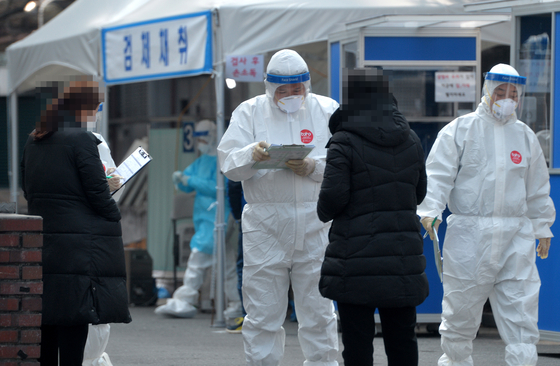![While the new coronavirus infection (Corona 19) is spreading, medical staff are conducting tests on citizens who visited a corona 19 screening clinic at a public health center in Daejeon on the 8th. [프리랜서 김성태]](https://i0.wp.com/pds.joins.com/news/component/htmlphoto_mmdata/202103/11/efc5cd7b-9b4d-4e5e-939f-1a09c6eabc6b.jpg?w=560&ssl=1)
While the new coronavirus infection (Corona 19) is spreading, medical staff are conducting tests on citizens who visited a corona 19 screening clinic at a public health center in Daejeon on the 8th. [프리랜서 김성태]
We expect the Bank of Korea to maintain its monetary policy easing stance for the time being. This is because the possibility of rapid inflation (increased inflation) due to the recovery trend of the novel coronavirus infection (Corona 19) is not high. Although vaccinations in major countries are in progress, it is judged that the aftermath of Corona 19 has not been resolved, such as continued sluggish employment. However, it was assessed that the risk of financial imbalances increased as the prices of assets such as domestic stocks and houses rose unusually fast.
[ 한은 통화신용정책보고서]
The BOK held the Financial Monetary Committee on the 11th and decided on a monetary credit policy report containing these details. The Monetary Credit Policy Report is a report submitted by the BOK to the National Assembly more than once a year, summarizing the details and background of monetary credit policy decisions and future policy directions.
“The possibility of continued expansion of inflation is small”

Source: Bank of Korea
The reason why the BOK made its outlook on inflation is that concerns over a sharp inflation have been raised recently. The rise in international energy prices since last year has been affecting inflation.
In fact, international oil prices (based on Dubai oil) dropped to $19.61 per barrel in April of last year, and then rose to $58.66 on the 5th of last month, nearly three times over a year. Domestic energy prices, combined with the prices of crude oil and natural gas, also rose 4.9% from June of last year to January of this year.
In particular, the price of the table (food prices, etc.), which is closely related to the perceived price of consumers, has risen all at once from the second half of last year. This is because the price of livestock products has risen due to the spread of avian influenza (AI) in Korea, and the crop of agricultural products has deteriorated due to worsening weather conditions.
Concerns about inflation are expressed in various indicators. The US 10-year Treasury bond rate, which is considered a sign of inflation, rose to the low 1.5% on the 10th (local time) after hitting a low of 0.51% in August last year. The expected inflation rate for the general public (citizens’ estimate of the consumer inflation rate for the next one year) rose 0.4 percentage points from 1.6% in May last year to 2% last month.
Nevertheless, the BOK’s analysis is that it is unlikely that inflation will expand. It is from the judgment that there is potential uncertainty because the aftermath of Corona 19 has not been resolved. There is a possibility that the formation of group immunity will be delayed than expected, such as cases of refusal of vaccination in developed countries such as the United States and Europe, and some emerging countries are not able to secure enough vaccines.
Park Jong-seok, deputy governor of the Bank of Korea, said, “Inflation is reflected in the global economic recovery trend and liquidity expansion due to financial easing policies. “The possibility of continued inflation expansion will be limited due to the uncertainty in Korea.”
Increasing household debt, increasing risk… Concerns about financial imbalances

Source: Bank of Korea
Following last December, the report warned of the risk of financial imbalances in Korea. Financial imbalance is a phenomenon that occurs when the size of the debt greatly exceeds the present value of future income calculated by the economy’s production capacity. This means that as the rate of increase in household debt has accelerated, the risk to the economy has increased as well.
This is attributed to an increase in individual stock investment due to the’debt investment’ fever that has continued since last year, and housing-related loans have increased due to a surge in house prices. In fact, the BOK evaluated that the rate of increase in domestic asset prices was considerably faster than in major countries such as the United States and Germany.
According to the Korea Real Estate Agency, the rate of increase in home sales prices nationwide last year was 0.42% (September 20) → 0.32% (October 20) → 0.54% (November 20) → 0.94% (December 20). Has risen sharply. Currently (as of February), the rate of increase in home sales prices rose 0.89% from the previous month and remains at a high level.
Lee Sang-hyung, head of the Monetary Policy Bureau of the Bank of Korea, said, “The rise in domestic asset prices was affected by the easing of macro-financial policies at home and abroad, and the optimistic expectations of asset prices that will rise.” The sharp reduction, which led to concerns about supply shortages, and because housing prices rose quite quickly, we estimate that expectations for further increases in prices were high.”
Therefore, the BOK emphasized the need to pay attention to the possibility that the risk of financial imbalances may accumulate in future monetary policy operations. This is because demand for funds related to the spread of Corona 19 remains, and demand for transactions related to home sales and jeonse remains, so there is a high expectation that household loans will increase for the time being.
Director Lee said, “Improving financial conditions through stock price hikes has an aspect of contributing to the recovery of the real economy.” It should be noted that there is a possibility that it will become.
Reporter Yoon Sang-eon [email protected]
![]()
